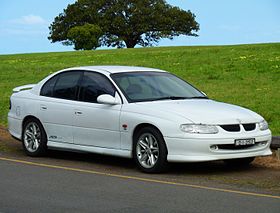Holden Commodore (VT)
| Holden Commodore (VT) | |
|---|---|
 |
|
| Overview | |
| Manufacturer | Holden (General Motors) |
| Also called | Holden Berlina (VT) Holden Calais (VT) Chevrolet Lumina Chevrolet Omega |
| Production | 1997 – 2000 |
| Assembly | Australia: Elizabeth, South Australia |
| Body and chassis | |
| Class | Executive car |
| Body style | 4-door sedan 5-door station wagon |
| Platform | GM V platform |
| Related |
Opel Omega B Holden Statesman/Caprice (WH) HSV VT series CSV VT series Holden Coupe (concept) |
| Powertrain | |
| Engine | 3.8 L Ecotec V6 3.8 L Supercharged Ecotec V6 5.0 L 5000i V8 (Series I only) 5.7 L Generation III V8 (Series II only) |
| Transmission | 4-speed GM 4L60-E automatic 5-speed Getrag 260 manual 6-speed T-56 manual |
| Dimensions | |
| Wheelbase | 2,788–2,938 mm (109.8–115.7 in) |
| Length | 4,882–5,040 mm (192.2–198.4 in) |
| Width | 1,824 mm (71.8 in) |
| Height | 1,422–1,468 mm (56.0–57.8 in) |
| Curb weight | 1,551–1,702 kg (3,419–3,752 lb) |
| Chronology | |
| Predecessor | Holden Commodore (VS) |
| Successor | Holden Commodore (VX) |
The Holden Commodore (VT) is a executive car that was produced by the Australian manufacturer Holden from 1997 to 2000. It was the first iteration of the third generation of this Australian made model and the last one to be powered by a locally made V8 engine (1999). Its range included the luxury variants, Holden Berlina (VT) and Holden Calais (VT) but not a new generation utility version.
Introduced in August 1997, the VT-series represented Holden's largest development yet. On debut, it won the 1997 Wheels Car of the Year award, resulting in the fourth time that this award was won by a Commodore. It found ready acceptance in the market as many buyers steered away from the more radically designed Ford Falcon (AU), becoming the best selling Commodore and cementing its place as number one in Australian sales at its time.
A VT Series II (VT II) was released in 1999, before being replaced by the re-styled VX model in 2000. In 1998, the VT formed the basis of a prototype that became the catalyst for the re-introduction in 2001 of the Holden Monaro coupé—a nameplate on hiatus since 1977.
As with previous Commodore models, Holden looked to Opel in Germany for a donor car. The VT series was derived from the Omega B by broadening that vehicle's width and adapting the mechanical setup for Australian conditions. The alternative would have been to adopt the Omega as is (which, notably, was also sold in North America as the Cadillac Catera between 1997 and 2001), save for the engines and transmissions or just reskinning the second generation (VN–VS) architecture.
The VT series ended up being a A$600 million development program that spanned more than half a decade. It sported many firsts for an Australian-built car (such as more advanced electronic systems), improved dynamics and increased crash safety also thanks to a body that was 30 percent stiffer than its predecessor, the VS series.
...
Wikipedia
